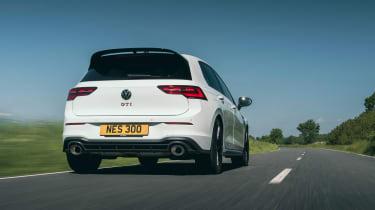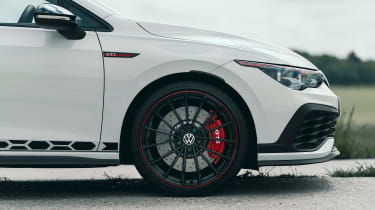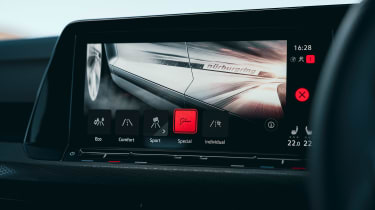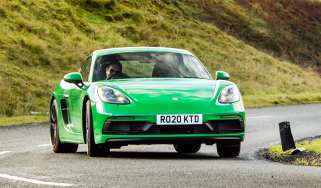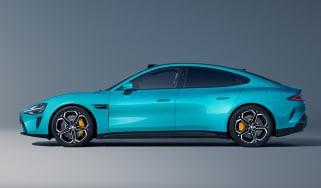Volkswagen Golf GTI Clubsport 45 2021 review – stickers and stripes, but little else
Hot Golf 8s are getting there, but the GTI Clubsport 45 suffers the same niggles and lapses of judgement as its siblings
When we first had a go in the new Volkswagen Golf GTI Clubsport it’s fair to say we came away more than a little disappointed. Yes, it had more power, focus and stamina than the standard GTI, but it also lacked traction and grip from its base tyre package, and a sense of engagement you’d think crucial to this most ‘driver focused’ of performance Golfs.
So given the chance to drive the new GTI Clubsport 45 – a limited-edition version in celebration of the GTI’s 45th anniversary – we also thought it a chance for redemption as not only does it pack most of the kit we thought missing from the standard Clubsport, but builds on it further with some bespoke styling enhancements, an Akrapovič exhaust and lifted 166mph speed limiter (useful in the UK, as always).
The Clubsport 45’s mechanical basis is as found in the standard GTI Clubsport, which pairs a 296bhp version of its 2-litre turbocharged four-cylinder engine with front-wheel drive, a seven-speed DSG and an electronically controlled limited-slip differential. Torque is rated at 295lb ft, available on a broad spread of revs between 2000 and 5000rpm, the latter point at which peak power is also made.
More reviews
Group tests
In-depth reviews
- Used Volkswagen Golf GTI (Mk5, 2004 - 2009) review – one of the best VWs of the last 30 years
- Volkswagen Golf GTI 2025 review – the quintessential hot hatch improved but not perfected
- Used VW Golf GTI (Mk7, 2013 - 2020) review – still the best hot hatch all-rounder
Reviews
- Volkswagen Golf GTI Edition 50 review – finally a match for Honda’s Civic Type R?
- Volkswagen Golf GTI Clubsport Mk8.5 2025 review – a cut-price Honda Civic Type R?
- Used Volkswagen Golf GTI TCR (2019) review – Mk7’s soft sendoff beats any Mk8
- Volkswagen Golf GTI Clubsport S (2016, Mk7): an ultra-exclusive hot hatch great
It also shares the Clubsport’s stiffened front subframes, 15mm lower ride height and more aggressive front axle geometry as compared to the standard GTI. This example also packs the optional adaptive dampers (hallelujah), and 19-inch Goodyear Eagle F1 SuperSport tyres as opposed to the Bridgestones of Clubsports on the base 18-inch wheels.
Warm day, windows down, ready for a drive... but you must stop. Remembering this is a new Golf, we’ve got to set about sorting the driver settings before moving off – a distracting and long-winded process. Start by pressing the driver mode, er, pad (it’s not a button, so you need to look down to make sure you’re hitting the right spot), select ‘Individual’, then Sport for drivetrain, steering, engine sound (it’s virtually silent otherwise), and then consider the sort of road you’ll be traversing as there’s a 15-stage choice on the dampers.
Best also get on top of the traction and stability controls, and there’s no button for those either, so that’s a flick down from the top of the touchscreen, prod the ESC menu button, another drop-down menu appears, select ‘OFF’, but it’ll then prompt you to confirm. Confirmation made, but the drop down is still there, so you exit that bit, and finally press the ‘home’ button to get back. Exhale, ready to go. Now you know why you can’t do this on the move.
Just as with the standard Clubsport, there’s a level of intensity to the 45 lacking in other hot Golfs. The ride is immediately tighter, the steering more resilient and textured through the wheel and, thanks to the Akrapovič exhaust, there’s also a subtle uplift in engine volume, even if it still lacks a particularly nice character. Normal warming up motions complete, put your foot down and, where you’re expecting adhesion, the wheels just spin, again…
So torquey is the powertrain, that once boost is built the tyres just seem uninterested in capturing any of that forward momentum. The same result happens when accelerating out of corners too. In fact it’s even more poignant given there’s a proper mechanical limited-slip differential up there, because as far as I can tell it’s having little to no effect. At most speeds, any substantial application of throttle out of a corner has the revs howling and the front wheels, or perhaps wheel, spinning pointlessly.
> 2021 Renault Megane RS 300 Sport review
It’s the same story on turn-in – the car has fairly good lateral grip, but it reaches its limits far earlier than expected, well before the rear end has any inclination to get involved. It never really keys into the road surface either, and any sudden inputs of steering or throttle instantly overwhelm the front end, it often skating across the road as if in greasy post-rainstorm conditions rather than the dry, warm and sticky tarmac during our test.
There was a time when nearly 300bhp, almost 300lb ft of torque and front-wheel drive wouldn’t have been compatible, but 2021 is a very different era of suspension, differential and tyre technology, which is why it doesn’t afflict rivals such as the Honda Civic Type R, Renault Mégane RS and even the aloof Ford Focus ST. All have the Golf completely outclassed when it comes to how effectively the nose behaves.
And what about when not putting your foot down? It’s a bit of a mixed bag really. The brakes are impressively powerful and resilient, but let down by two elements. The first relates back to the rubber, as the tyres once again don’t seem to respond favourably to sharp inputs, but the second is a lack of feel from the pedal itself. It’s both overservoed and has too much braking force in the first part of the pedal travel. This makes accurately and subtly using the brakes to trim your line or brushing speed off mid-corner difficult to judge, even with sustained time behind the wheel.
The dampers are far more successful, complementing the spring rates perfectly, and with all that variability built-in, helping you squeeze the most from what is an inherently sweet chassis without hitting a metaphorical wall. It almost feels like if the dampers aren’t quite right then it’s the driver’s fault for not choosing the right setting – which would be a lot easier to justify if that variability wasn’t buried so deep in the flawed digital interfaces. Exit the driver mode screen to change the radio station or reset the climate control after having accidentally enabled the heated seats (which is painfully easy to do) and there’s very little desire to dig back in there and find it – especially when driving down a difficult road that would have you reaching for the driver modes in the first place.
In essence, the Golf GTI Clubsport 45 (or indeed a standard Clubsport with the right option boxes ticked) is still a very talented hot hatchback, with a chassis, engine, transmission and handling set-up that we know can be a potent and engaging combination. The annoyance is that it’s undone by poor choices, be that of tyres, specification or interface. There’s little if anything between the standard Clubsport and this 45 when specified correctly, and against a Golf R it is the sweeter of the two on account of its purer steering feel and the extra agility its 90kg weight advantage makes good use of. Which is where the money comes in.
Prices and rivals
The basic Clubsport 45 comes in at £39,980, some £2750 more than the standard Clubsport and £685 more than the R. But for that amount, the larger 19-inch wheels and Akrapovič exhaust more than make up for the price difference, so it sounds like a good deal in that respect. What’s not is the need for a few optional upgrades all of these high-performance Golfs should really have as standard. Those adaptive dampers cost an extra £785 and really are a crucial part of the dynamic package, but the £300 for a rear camera and £270 for heated seats and steering wheel also feel a little tight on VW’s part.
As for rivals, it doesn’t take long to find ones that easily outshine the Clubsport 45. Honda’s superb Civic Type R in any form is head and shoulders above the Golf, and at a smidge over £36k for the laden GT model there’s no compromise on equipment. The Renault Mégane RS is also a more complete and talented hot hatchback, and at £33k for the sweet RS 300 base model, is also a big chunk cheaper.
Desirability still counts for a lot though, so too residual values, which is where the VW claws back much of its deficits as an ownership proposition. You’d have to really want that GTI badge on the bootlid to justify the extra cash compared to the Civic or Mégane, though – they really are two of the finest hot hatchbacks of the modern era.
Volkswagen Golf GTI Clubsport 45 specs:
| Engine | In-line 4-cyl, 1984cc, turbo |
| Power | 296bhp @ 5000rpm |
| Torque | 295lb ft @ 2000-5200rpm |
| Weight | 1461kg |
| Power-to-weight | 206bhp/ton |
| 0-62mph | 5.6sec |
| Top speed | 166mph |


